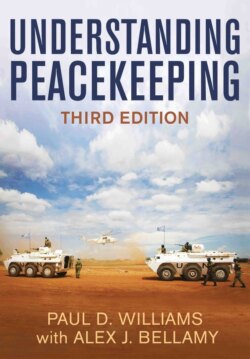Читать книгу Understanding Peacekeeping - Alex J. Bellamy - Страница 21
Liberal peace
ОглавлениеWithout doubt this has been the most influential theory in relation to peace operations. It is not hyperbole to say that both the theory and the practice of the vast majority of peace operations have been informed by a commitment to the liberal peace (see Paris 1997, 2002, 2004). At the interstate level, liberal peace is based on the observation that democratic states do not wage war on other states they regard as being democratic. This is not to argue that democracies do not wage war at all or that they are less warlike in their relations with non-democracies, only that democracies tend not to fight each other. In addition, liberal democracies are said to be the type of states least likely to descend into civil war or anarchy.
Exponents of this theory generally present two reasons to explain why that might be. First, through their legislatures and judiciaries, democratic systems impose powerful institutional constraints on decision-makers, inhibiting their opportunities for waging war rashly (Owen 1994: 90). These inhibitions are further strengthened by the plethora of international institutions (such as the UN) to which liberal democratic states are tied. Democracy prevents civil war primarily because it guarantees basic human and minority rights and offers non-violent avenues for the resolution of political disputes. The second explanation of liberal peace is normative and holds that democratic states do not fight each other because they recognize one another’s inherent legitimacy (Owen 1994) and have shared interests in the protection of international trade which are ill-served by war (Hegre 2000). Within states, the legitimacy associated with democracy makes it very difficult to mobilize arms against the prevailing order, reducing the likelihood of civil wars. In arguing that peace operations are informed by liberal peace theory, we mean that many of them have been mandated to stabilize war-torn territories by promoting and defending liberal principles of politics, economics and even society (see box 1.1).
